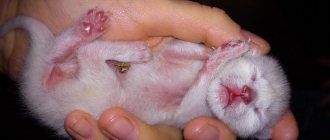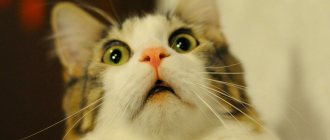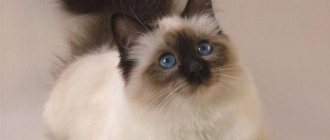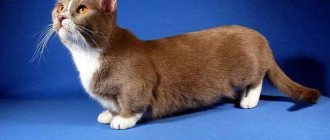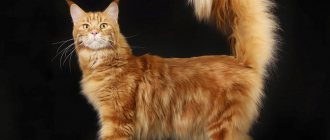At all times, rat-catching cats were highly valued by humans. This is due to the fact that, despite a highly developed hunting instinct, most purrs prefer to see mice and small birds as prey, and avoid rats. However, rats are the most dangerous pests that live side by side with people.
They not only steal food and gnaw everything, causing considerable damage, but can also attack humans, especially small children. Considering that rats carry many diseases, their bite can cause death. They also cause a lot of trouble to agriculture.
Hunting instinct in cats
Hunting instinct is the level of an animal's natural interest in hunting live prey. Even domestic cats have it and can easily be tested at home. To determine how developed the hunting instinct is, you need to scratch your fingers on the surface. The faster a cat reacts to a sound, the higher its level of interest.
Cat hunting consists of several mandatory stages, including:
- prey detection;
- sneaking up on the victim;
- decisive shot;
- holding with teeth.
The hunting instinct is well manifested in games with a pet. Before throwing, the animal freezes and begins to sway, tensing its body. If the prey escapes, the cat expresses dissatisfaction with its voice.
The level of development of the hunting instinct is influenced by the conditions of keeping animals. Cats living in apartments catch mice for fun. Yard cats are more adapted to hunting and do it not out of interest, but for food.
On a note. All kittens from birth have the makings of a predator. But they learn hunting techniques from their mother. If kittens do not learn the appropriate skills at an early age, they will not catch mice in the future.
Who is better at catching mice, a cat or a cat?
According to experts, cats are the best rodent hunters. Unlike cats, they catch mice and rats without being distracted by such secondary factors as the instinct of reproduction and the protection of personal boundaries.
The hunting instinct is most pronounced in domestic females before the onset of estrus and during the period of feeding offspring. In addition, it is cats who teach growing kittens how to hunt, while simultaneously honing their own skills.
Important! Cats perceive all birds and small rodents as potential prey, without dividing them into friends and foes. Therefore, if in addition to mustachioed predators in the house there are hamsters, parrots and other living creatures, it must be protected from cat claws.
We recommend viewing
All about Sphynx cats How much do Maine Coon cats cost? Are they worth the money? All about Maine Coon cats
When she is ready, the cat will complete the kill. The mouse can be decapitated by its claws or chewed by its teeth. A cat thirsty for blood may bite off the head of a mouse.
This type of pursuit exhausts cats, requiring a lot of movement and energy. As a result, some cats choose a more passive approach. They find out where the mice are hiding and lie low and wait. If a mouse comes out of its hole, the cat immediately attacks.
How many mice do cats kill per year?
There is no exact answer to this question. This depends on a number of factors, including:
- temperament and cat breed . Not all cats like to hunt mice
- Population of mice in the area . More mice means more hunting opportunities
- Hunger . Feral cats kill more than domestic cats because they cannot rely on humans for food
- Age . As cats age, they have difficulty coping with the physical demands of hunting.
According to the journal Nature Communications, domestic cats that roam outdoors kill up to 22 billion mammals every year. It's not just mice. Some cats hunt larger prey, including shrews, rats, and even rabbits or squirrels.
How many mice do cats eat per day?
Again, this figure is not constant. Typically, a domestic cat will not eat mice. Some owners find this a relief. Eating mice can make cats sick, as small animals carry diseases.
Feral cats are more likely to eat mice for food and protein. If a cat eats only mice, it will need to eat on average about eight mice per day to feed itself. A cat needs 240 calories a day to live, and one mouse provides about 30 of them.
However, only the most energetic and energetic cat would have the energy to hunt eight mice a day. Most cats supplement their diet with other, slower prey.
Why do cats catch mice and not eat them?
As already mentioned, cats hunt to satisfy their natural urges and drives. Just because your cat catches a mouse doesn't mean she will eat it. A well-fed domestic cat rarely eats its prey.
On the contrary, such a cat often leaves the corpse of a mouse where it has finished killing. Alternatively, the cat may take the corpse back to its usual territory as a trophy or present it as a gift to its owner.
This is one of the least attractive elements of ownership. Resist the urge to react with disgust. Your cat expects you to praise her hunting prowess. She may even give you a mouse because she's worried that you won't be able to hunt and feed yourself.
Which breeds are better at catching mice?
Cats that do not belong to a specific breed are the best at catching mice. The effectiveness of hunting by such individuals is explained by their lifestyle and the need to independently obtain food. And although their “professionalism” is incomparable with the hunting skills of purebred cats, among the latter there are also recognized rat catchers.
These include indigenous varieties, the formation of which occurred under natural conditions:
- American Shorthair. Representatives of this cat breed have a rich history and were previously used to catch rodents in food warehouses and stores.
- Burmese cat. This intelligent and charming animal loves to eat and is a master at catching mice.
- British Shorthair. The compact cat with a plush coat is also considered a good hunter. She not only catches mice, but often brings them to their owners.
- European cat. Similar animals were common in Ancient Rome. They prefer to hunt at night and are considered excellent rat catchers.
- Cymric. These powerful, short-tailed cats with sharp claws are designed to be kept in open areas and have innate hunting skills.
- Kurilian Bobtail. The bobtail cat has long hind legs, due to which it can develop high speed and jump long distances. The Kurilian Bobtail is capable of not only catching a mouse, but also driving away strange dogs that have sneaked into the area.
- Maine Coon. A powerful cat with well-developed muscles and strong hunting instincts, it is suitable for keeping in a private home with free access to the outdoors. The Maine Coon reacts with lightning speed to rodents and leaves them no chance.
- Manx. These cats have always been popular among farmers and sailors. They have developed hunting instincts and are skilled at catching mice.
- Nibelung. Rare long-haired cats with a complex, freedom-loving character are endowed with developed hunting instincts and are known as excellent rat catchers.
- Russian blue. The small cat has lightning-fast reactions and can move silently. She is able to catch the slightest rustle and immediately rushes in pursuit of prey.
- Siberian. A fast cat with excellent reactions is considered an unrivaled hunter. The shaggy Siberian prefers to live in wide open spaces and can pursue prey in any weather.
American shorthair cat
Burmese cat
Cymric cat
Kurilian Bobtail
Siamese, Abyssinian, Bengal, Burmese and Persian cats are good at catching mice. All of them were formed in natural conditions with minimal human intervention and do an excellent job of fighting rodents.
Russian blue
The average size of the breed sometimes gives reason to doubt the abilities of the rat catcher. But the Russian Blue has a secret weapon - quick reaction and the ability to move without making noise.
Features:
- instant reaction to moving targets;
- grace and precision of movements;
- speed before throwing.
If anyone has been able to observe the manners of a Russian Blue during a hunt, he compares mannerisms with art. Generation after generation, representatives of the breed confirm their primacy among rat catchers. If the Russian Blue lives in the house, there will not be problems with rodents for long.
British Fold cat breed
Kurilian Bobtail
Russian blue cat
The main signs of a mousecatcher cat
In order for a kitten to become a good rat catcher in the future, it must be taken from a mother who has well-developed hunting instincts. And so that she has time to pass on her skills to her offspring, it is recommended to pick up the baby no earlier than 4 months.
On a note. If a kitten is adopted from a stray mother, there is a high probability that it will grow into an excellent mouser. In purebred animals, the hunting instincts are dulled, especially if several generations of his ancestors were housed.
You can also determine which kittens will catch mice in the future by their appearance. It is believed that a good hunter should have the following characteristics:
- A triangular head with powerful jaws, long mustaches and high-set ears topped with tassels.
- Camouflage color. It is believed that cats with tortoiseshell, pied, grey, red, black, tabby or spotted coats have an easier time remaining undetected.
- Short hair. A thick, long coat interferes with hunting and, when wet, acquires a characteristic odor that repels mice and rats.
- Well-built body with strong bones, well-developed muscles and large paws.
Is it possible to teach a cat to catch mice?
In the absence of appropriate conditions and proper upbringing, even a kitten with good heredity will not make a good hunter. You can help your pet develop natural instincts and learn to catch mice by using games with live bait. To do this, you need to set traps and give the rodents caught in them to the cat. Instead of live bait, you can use special toys or a laser pointer.
On a note. Games are a powerful stimulant, but they need to be used in doses. Otherwise, the cat will completely satisfy its hunting needs with such entertainment and will not catch mice.
To awaken natural instincts in your pet, you should not overfeed it. It is necessary to reduce its portion so that the cat feels a slight feeling of hunger. Malnutrition activates the animal's interest in mice and awakens its hunting instincts. You cannot completely deprive your cat of food, as this will lead to health problems.
Do neutered cats catch mice?
Neutered cats usually do not lose interest in hunting and are even more active in catching mice. They do not waste energy on bearing and feeding their offspring, but direct it to fighting rodents.
After castration, cats become less active and often gain weight. Because of this, many of them lose their hunting skills. In order for a cat to continue catching mice after castration, he needs to be switched to a special dietary food and stimulated with games.
The desire to catch mice is inherent in cats at the genetic level. Therefore, almost any kitten can be raised into a good hunter. The main thing is not to forget to praise him for showing his instincts and stimulate him with outdoor games.
How to raise a good hunter?
For good work, the animal must receive praise and treats.
Although rat-catcher cats begin to hunt from childhood and have the necessary instincts, it is still important to pay attention to the animal in terms of education and development of hunting skills. A devoted pet will definitely bring its first trophy to its owner. At this moment, it is important to show the significance and importance of the cat’s efforts, pet him, say a kind word, treat him with a treat. Even if a cat brings a caught mouse or rat into the house, it is forbidden to scold it, much less punish it. So the animal will think that it is doing wrong, after which its desire to catch rodents will disappear. There is no need to throw prey into the trash can in front of the cat. This hurts and offends the pet; she will stop trying to please the owner, who will ultimately be left alone with the problems caused by rodents.
In addition, it is important to keep in mind that if the rat-catcher cat is not provided with special conditions for active, active games, walked only on a leash, or not allowed out of the house or apartment at all, he will eventually lose all instincts and become an ordinary, lazy cat. The best rat hunters grow up in outdoor conditions, where you must always be on the alert and use the full range of natural instincts and habits.
